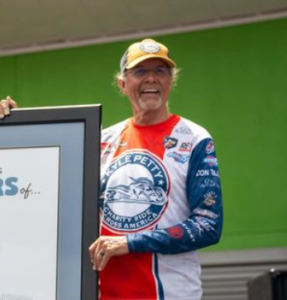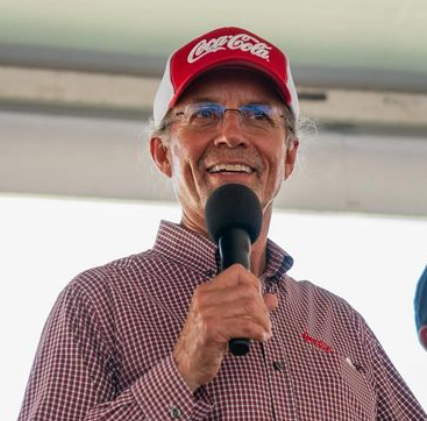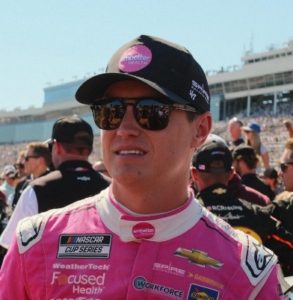The exchange between Denny Hamlin and Kyle Petty highlights a significant moment in NASCAR’s evolution
Hamlin’s strategy at the Quaker State 400, driven by data and analytics, represents a shift towards more calculated decision-making in racing.
Petty’s criticism reflects a resistance to this change, emphasizing the tension between traditional racing methods and modern technological advancements.
As NASCAR continues to adapt and evolve, the sport will undoubtedly see further debates and discussions about the best approaches to racing, driven by both historical perspectives and contemporary innovations.
Denny Hamlin’s 2024 NASCAR Cup Series season has been marked by both success and struggle. While his impressive stats reflect his skill and consistency, his difficulties on superspeedways have highlighted areas for improvement.
Hamlin’s defensive racing strategy is a testament to his adaptability and experience, but continued adjustments and strategic planning will be crucial for navigating the challenges of superspeedway racing.
As the season progresses, Hamlin’s ability to address these issues and capitalize on his strengths will be key to his success and playoff performance.

Also Read: Donovan Mitchell Bio, Age, Career, Family, Net Worth And More
Table of Contents
Denny Hamlin’s Strategy at Atlanta Motor Speedway
The Initial Struggles
Denny Hamlin’s weekend at the Atlanta Motor Speedway got off to a rough start. Following a post-qualifying plug wire change, both Hamlin and his teammate Martin Truex Jr. found themselves starting from the back of the pack.1
While Truex Jr. managed to make notable progress, finishing ninth in Stage 1 and 18th in Stage 2, Hamlin’s efforts fell short. He struggled throughout the race, ultimately finishing 34th and 29th in the respective stages.
The Final Lap Chaos
The race took a dramatic turn during the final lap when Chase Elliott collided with Ross Chastain, leading to a massive pile-up that ensnared several drivers, including Hamlin.
This incident underscored the unpredictability of superspeedway racing, where chaos can arise in an instant and drastically affect race outcomes.
Atlanta was a great race weekend. I was so fortunate to be able to spend the evening with my friends, Allison and her mom, Grace. We met sometime in the late 80s and we have been friends ever since. Some people touch your heart and stay with you forever. Allison did that for me. pic.twitter.com/i0XAgGYrQ9
— Kyle Petty (@kylepetty) September 9, 2024
Hamlin’s Post-Race Explanation
In his post-race interview, Hamlin explained that he anticipated a higher likelihood of chaos at the 1.54-mile oval.
His strategy aimed to accumulate 20 points from the weekend, reflecting his attempt to maximize his gains despite a challenging race.
Hamlin acknowledged that while his strategy might not have been ideal, it was a calculated decision based on his understanding of the race dynamics.

Kyle Petty’s Criticism
A Scathing Response
Kyle Petty, a former NASCAR driver and current commentator, did not hold back in his criticism of Hamlin’s strategy.2
Petty was particularly outspoken about Hamlin’s “20 points” mindset, expressing disbelief that such an approach was being employed in modern NASCAR.
Petty’s criticism reflected a broader concern about the evolving nature of racing strategies and the perceived shift away from traditional racing principles.
The Historical Context
Petty’s reaction highlights a key point of contention: the contrast between contemporary data-driven strategies and traditional racing methods. In Petty’s era, racing strategies were often more straightforward, with drivers relying on their instincts and experience.
The introduction of advanced analytics and data-driven approaches has changed the landscape, and Petty’s comments underscore a tension between these two approaches.

Denny Hamlin’s Response
Addressing the Criticism
Hamlin responded to Petty’s remarks on his podcast, emphasizing that while his strategy may not have been flawless, it was a deliberate choice based on his current circumstances.3
He acknowledged that his performance at superspeedways had been lackluster, with no top-10 finishes this year.
This context informed his decision to adopt a strategy that aimed to maximize his points haul despite the challenges.
Embracing Data and Analytics
Hamlin’s response also touched on the role of data and analytics in modern racing. He pointed out that while such tools were not available in Petty’s time, they are now integral to the sport.
Hamlin argued that leveraging data and analytics is essential for making informed decisions and staying competitive. His use of these tools reflects a broader trend in NASCAR, where technology and data play a crucial role in shaping race strategies.

The Shift to Data-Driven Approaches
The debate surrounding Hamlin and Petty underscores a significant shift in NASCAR’s approach to racing strategies.
The advent of data analytics has revolutionized the sport, allowing teams and drivers to make more informed decisions based on a wealth of information.
This shift represents a departure from the more intuitive and experience-based strategies of the past.
Balancing Tradition and Innovation
As NASCAR continues to evolve, balancing traditional racing wisdom with new technological advancements becomes increasingly important.
Drivers like Hamlin who embrace data-driven strategies are pushing the boundaries of what is possible in the sport, while those who hold onto traditional methods may struggle to keep up. This tension between tradition and innovation is a defining characteristic of modern NASCAR.

Also Read: Juan Pablo Montoya’s One-Time NASCAR Return Explained by The 23XI Racing Team Owner and Anniversary
Kyle Eugene Petty: Bio
A Legacy in Racing
Kyle Eugene Petty, born on June 2, 1960, in Randleman, North Carolina, comes from a distinguished racing family.
His father, Richard Petty, known as “The King,” is one of the most celebrated figures in stock car racing history.
His grandfather, Lee Petty, was also a prominent racer, establishing the Petty family’s deep roots in the sport.
Racing was not just a career choice for Kyle but a family tradition, deeply embedded in his upbringing.
Kyle Petty’s journey in racing began in his teens. He initially competed in the NASCAR Camping World Truck Series before making his debut in the NASCAR Cup Series in 1979.
His early career saw a mix of success and challenges, but his perseverance and dedication quickly marked him as a talented driver. Throughout the 1980s, Petty honed his skills, gradually establishing himself as a competitive force in the series.
Early Life and Racing Heritage
- Petty’s career was highlighted by several notable achievements. One of his most significant accomplishments came in 1995 when he won the Coca-Cola 600 at Charlotte Motor Speedway, a race that is considered one of the most prestigious events in NASCAR.
- This victory was a testament to his skill and determination as a driver. Petty’s career also included multiple top-ten finishes and a reputation for his tenacity on the track.
- Despite his successes, Kyle Petty faced several challenges throughout his career.
- The competition in NASCAR is fierce, and Petty encountered periods of struggle with his teams and performance.
- Additionally, the tragic loss of his son, Adam Petty, in a crash during a practice session in May 2000, deeply affected him and the racing community.
- The incident was a devastating blow and brought to light the inherent risks of the sport.

Kyle Eugene Petty: Career
Transition to Team Ownership
Following his driving career, Kyle Petty transitioned into team ownership and management. He took on the role of CEO at Petty Enterprises, the family-owned team that had been a cornerstone of NASCAR.
Under his leadership, the team continued to compete at a high level, maintaining the Petty family’s legacy in the sport. This period marked a new chapter in Petty’s career, focusing on nurturing and developing new talent while keeping the Petty name prominent in NASCAR.
In 2008, Petty announced his retirement from competitive racing. His final stint behind the wheel was with the No. 45 Dodge Charger for Petty Enterprises. Retirement from driving marked the end of an era for Petty, but it also signaled the beginning of his new role as a commentator and analyst.
His extensive knowledge and experience made him a valuable asset in the broadcasting booth, where he continued to contribute to the sport in a different capacity.
Commentating Career
Kyle Petty’s transition to a racing commentator allowed him to stay connected with the sport he loves. He joined the ranks of analysts and commentators, offering insights and perspectives based on his extensive experience as a driver.
His commentary is characterized by its depth and understanding of the nuances of racing, making him a respected voice in the NASCAR community. Petty’s ability to convey the excitement and complexity of the sport has earned him recognition and respect from fans and peers alike.
Philanthropy and Community Involvement
Beyond his racing career, Kyle Petty has been actively involved in philanthropy. He established the Kyle Petty Charity Ride Across America, an annual motorcycle charity ride that raises funds for various causes, including children’s hospitals and other charitable organizations.
This initiative reflects Petty’s commitment to giving back to the community and using his platform for positive change.
Kyle Eugene Petty: Legacy and Influence
Kyle Petty’s legacy in stock car racing is deeply intertwined with his family’s storied history in the sport. His contributions as a driver, team owner, and commentator have left an indelible mark on NASCAR.
Petty’s influence extends beyond his own achievements; he has played a significant role in maintaining the Petty family’s reputation and continuing their impact on the racing world.
Kyle Petty’s personal life is marked by both triumphs and tragedies. The loss of his son, Adam Petty, was a profound and heartbreaking moment for him and the racing community.
Despite the challenges, Petty has remained resilient, continuing to honor his family’s legacy and contribute to the sport in various ways. His personal experiences have shaped his perspectives and approach to both racing and philanthropy.
Impact on NASCAR
Kyle Petty’s impact on NASCAR extends beyond his own career. His involvement in team ownership and management helped shape the direction of Petty Enterprises and influence the sport’s development.
Additionally, his role as a commentator has provided fans with valuable insights and enhanced their understanding of the racing world. Petty’s multifaceted contributions have solidified his place as a key figure in NASCAR history.
As NASCAR continues to evolve, the Petty legacy remains a cornerstone of the sport. Kyle Petty’s contributions, both on and off the track, ensure that the Petty name will continue to be synonymous with excellence in racing.
His ongoing involvement in various capacities and his commitment to charitable causes reflect his enduring dedication to the sport and his family’s legacy.
Also Read: Jose Mourinho Aims for Fenerbahce to Sign Barcelona Star, Transfer News and More




